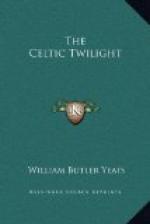1902.
A VOICE
One day I was walking over a bit of marshy ground close to Inchy Wood when I felt, all of a sudden, and only for a second, an emotion which I said to myself was the root of Christian mysticism. There had swept over me a sense of weakness, of dependence on a great personal Being somewhere far off yet near at hand. No thought of mine had prepared me for this emotion, for I had been pre-occupied with Aengus and Edain, and with Mannanan, son of the sea. That night I awoke lying upon my back and hearing a voice speaking above me and saying, “No human soul is like any other human soul, and therefore the love of God for any human soul is infinite, for no other soul can satisfy the same need in God.” A few nights after this I awoke to see the loveliest people I have ever seen. A young man and a young girl dressed in olive-green raiment, cut like old Greek raiment, were standing at my bedside. I looked at the girl and noticed that her dress was gathered about her neck into a kind of chain, or perhaps into some kind of stiff embroidery which represented ivy-leaves. But what filled me with wonder was the miraculous mildness of her face. There are no such faces now. It was beautiful, as few faces are beautiful, but it had neither, one would think, the light that is in desire or in hope or in fear or in speculation. It was peaceful like the faces of animals, or like mountain pools at evening, so peaceful that it was a little sad. I thought for a moment that she might be the beloved of Aengus, but how could that hunted, alluring, happy, immortal wretch have a face like this? Doubtless she was from among the children of the Moon, but who among them I shall never know.
1902.
KIDNAPPERS
A little north of the town of Sligo, on the southern side of Ben Bulben, some hundreds of feet above the plain, is a small white square in the limestone. No mortal has ever touched it with his hand; no sheep or goat has ever browsed grass beside it. There is no more inaccessible place upon the earth, and few more encircled by awe to the deep considering. It is the door of faery-land. In the middle of night it swings open, and the unearthly troop rushes out. All night the gay rabble sweep to and fro across the land, invisible to all, unless perhaps where, in some more than commonly “gentle” place—Drumcliff or Drum-a-hair—the nightcapped heads of faery-doctors may be thrust from their doors to see what mischief the “gentry” are doing. To their trained eyes and ears the fields are covered by red-hatted riders, and the air is full of shrill voices—a sound like whistling, as an ancient Scottish seer has recorded, and wholly different from the talk of the angels, who “speak much in the throat, like the Irish,” as Lilly, the astrologer, has wisely said. If there be a new-born baby or new-wed bride in the neighbourhood,




